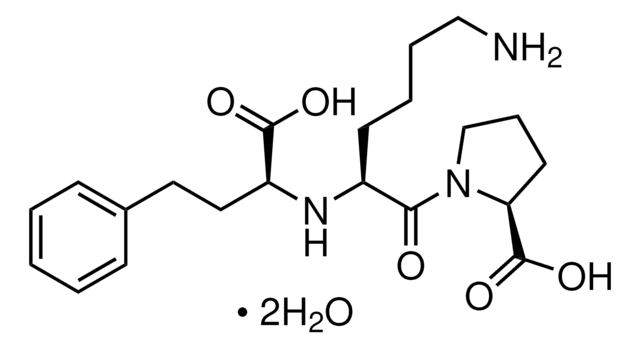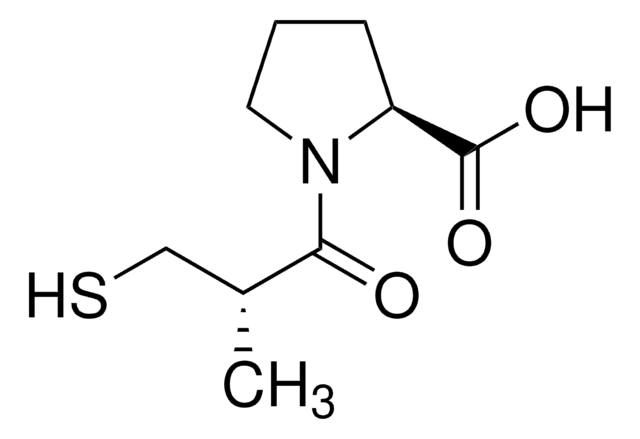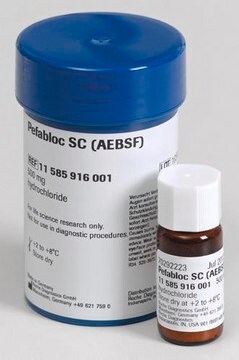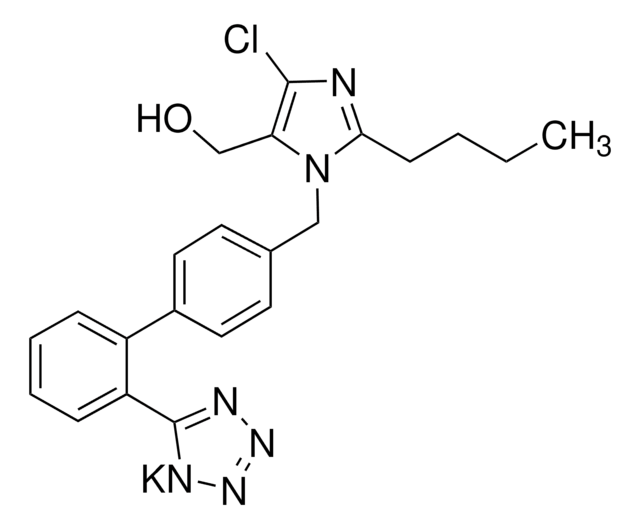推荐产品
品質等級
一般說明
Lisinopril is a nonsulfhydryl angiotensin-converting enzyme (ACE) inhibitor. It is used in the treatment of heart failure and hypertension. Lisinopril is an antihypertensive and anticongestive agent, like other members of its family. It is water-soluble and possesses weak chelating properties.
應用
Lisinopril has been used as an angiotensin-converting enzyme (ACE) inhibitor:
- in combination with spironolactone, to study their effects on cardiac and skeletal muscles in the Duchenne muscular dystrophy (DMD) mice model
- standard in in vitro ACE inhibitory assay
- as a negative control in ACE enzymatic assay
訊號詞
Danger
危險聲明
危險分類
Repr. 1A - STOT RE 2
標靶器官
Kidney
儲存類別代碼
6.1C - Combustible acute toxic Cat.3 / toxic compounds or compounds which causing chronic effects
水污染物質分類(WGK)
WGK 2
閃點(°F)
Not applicable
閃點(°C)
Not applicable
個人防護裝備
Eyeshields, Gloves, type N95 (US)
其他客户在看
Comparative Effects of Low and High Doses of the
Angiotensin-Converting Enzyme Inhibitor, Lisinopril, on
Morbidity and Mortality in Chronic Heart Failure
Angiotensin-Converting Enzyme Inhibitor, Lisinopril, on
Morbidity and Mortality in Chronic Heart Failure
Milton Packer
Clinical and Investigative Medicine. Medecine Clinique Et Experimentale (2017)
E J Wallis et al.
Clinical pharmacology and therapeutics, 64(4), 439-449 (1998-11-03)
The antihypertensive response to angiotensin-converting enzyme (ACE) inhibitors may be attenuated by a compensatory decrease in atrial natriuretic factor production. If so, inhibition of atrial natriuretic factor breakdown by neutral endopeptidase (NEP) may enhance the antihypertensive effects of ACE inhibition.
Angiotensin converting enzyme inhibitors and moderate hypertension.
McAreave and Robertson Jl
Drugs (1990)
R L Hamlin et al.
Journal of veterinary internal medicine, 12(2), 93-95 (1998-04-30)
This study was designed to determine the degree of inhibition of the angiotensin-converting enzyme (ACE) in 5 normal dogs given single doses of conventionally used ACE inhibitors (ACEis). In addition the time required for that inhibition to return to 50%
M L Ricketts et al.
Clinical science (London, England : 1979), 96(6), 669-675 (1999-05-21)
In the kidney and colon 11beta-hydroxysteroid dehydrogenase type 2 (11beta-HSD2) inactivates cortisol to cortisone, thereby protecting the non-selective mineralocorticoid receptor from cortisol. Deficiency of 11beta-HSD2 results in cortisol-mediated sodium retention and hypertension, suggesting that the physiological regulation of 11beta-HSD2 in
我们的科学家团队拥有各种研究领域经验,包括生命科学、材料科学、化学合成、色谱、分析及许多其他领域.
联系技术服务部门

![N- [3-(2-呋喃基)丙烯酰基]-Phe - 双甘氨酸](/deepweb/assets/sigmaaldrich/product/structures/225/349/530bc714-b1a8-4fdb-8082-a39329ee730a/640/530bc714-b1a8-4fdb-8082-a39329ee730a.png)





